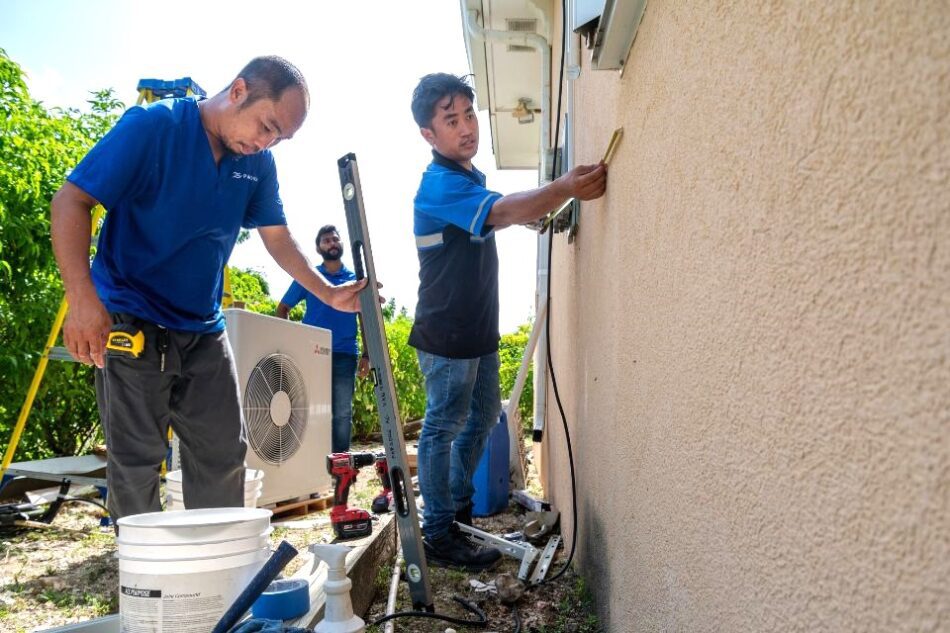Cayman: MSCRW Trains Over 70 Building Experts in New Energy Efficiency Guidelines


Following the success of a two-year residential and public sector energy efficiency programme, the Ministry of Sustainability and Climate Resiliency and Wellness (MSCRW), in collaboration with the Ministry of Planning, Agriculture, Housing, Infrastructure, Transport & Development (PAHIT&D), international energy experts Econoler, and the EU-funded RESEMBID Programme, has launched a new set of practical energy efficiency guidelines to support sustainable construction across the Cayman Islands.
The guidelines are designed to help suppliers, contractors, architects and developers integrate energy efficiency from the earliest stages of design and construction. This initiative supports the 2024–2045 National Energy Policy, which prioritises public awareness, incentives, and frameworks to promote low-energy, climate-resilient development across both new and renovated buildings.
To support rollout of the guidelines, MSCRW hosted two free virtual training sessions led by Econoler. The first session on 20 March focused on residential construction and was attended by 56 professionals from the construction and architecture sectors. The second, held on 27 March, was tailored to appliance retailers and provided strategies for promoting energy-efficient technologies. In total, more than 70 industry professionals participated, with 23 attending both sessions.
Eric Bush, Chief Officer of the Ministry of Planning, Agriculture, Housing, Infrastructure, Transport & Development, said: “At the Ministry of PAHIT&D, we believe that sustainable development must begin with smart design and construction. I’m proud to see this collaborative effort delivering real tools to help our local professionals build more energy-efficient homes and buildings from the ground up. These guidelines not only support the national energy and climate policies but also mean lower utility costs for families, reduced strain on our energy grid, and a more climate-resilient Cayman Islands. This is what progress looks like—practical, informed, and focused on empowering Caymanians today and for generations to come.”
Kristen Smith, Senior Policy Advisor, Ministry of Sustainability and Climate Resiliency and Wellness, added: “Energy efficiency is at its most impactful when it is integrated into the inception of building projects. This training provides those in the home construction and development industries with the latest residential energy efficiency guidelines so they can help Cayman’s tenants and homeowners keep cool and minimise their energy consumption. Our programmes in residential homes and public sector buildings have proven that energy efficiency pays off – for builders and residents alike.
“We have been impressed with the high turnout and level of engagement at both training sessions and initial feedback from the participants has been excellent too. We want to thank our partners for delivering this important training, and we appreciate everyone who took part as we continue to work together to build a more energy efficient Cayman Islands.”
The guidelines are a collaborative effort and were developed in consultation with the Department of Planning, Caribbean Utilities Company (CUC) Cayman Society of Architects Surveyors & Engineers (CASE) and the Cayman Contractors Association (CCA).
Recordings of the training course, along with specially created infographics and the technical course content are now available to all members of the public via the energy section of the MSCRW website.
The Energy Policy Unit also continues to deliver accessible community-based initiatives that support the goals of the National Energy Policy 2024-2045 and the Climate Change Policy 2024-2050, which aim to make the Cayman Islands more resilient and adaptive to climate change risks.
Public information and education continue to be at the core of the policy unit’s work, and the team have developed accessible online resources to help the wider community understand how to conduct their own energy audits, and prepare their home and property for the changing climate. The resources and guides continue to be available on the Energy website.
To learn more about the Energy Efficiency programme’s outcomes and recommendations, visit the Energy Unit website, www.gov.ky/energy.
Industry professionals and residents alike are encouraged to explore the resources available and become active partners in building a more energy-efficient, sustainable Cayman Islands.
About RESEMBID
The Caribbean Overseas Countries and Territories (OCTs) Resilience, Sustainable Energy and Marine Biodiversity Programme (RESEMBID) commenced operations on 1st January 2019 and will be implemented over a period of 58 months. The programme supports the sustainable human development efforts of the 12 Caribbean OCTs, namely: Anguilla, British Virgin Islands, Cayman Islands, Montserrat, Turks and Caicos Islands, Aruba, Bonaire, Curaçao, Saba, Sint Eustatius, Sint Maarten, and Saint-Barthélemy. The overall objective of RESEMBID is to support the sustainable human development efforts of participating countries and territories, with the thematic priorities being: Resilience, Sustainable Energy and Marine Biodiversity. To learn more, visit: https://resembid.org/
About Econoler
Econoler is an international consulting firm with 40 years of experience in the design, implementation, evaluation and financing of energy efficiency and renewable energy programmes and projects. Over the years, Econoler has contributed to developing and implementing about 5,000 projects in over 160 countries. Econoler has built its reputation thanks to the talents and innovation of its staff comprised of about 100 experts, including engineers, economists, financial specialists, marketing specialists and professional statisticians. The Econoler team includes energy efficiency experts with complementary expertise and knowledge, and who have worked extensively in the English Caribbean and are aware of the challenges faced by small island nations, especially in the energy sector. The training team has worked closely with the Ministry of Sustainability & Climate Resiliency and Wellness and several stakeholders to develop the Energy Efficiency Guidelines for Residential Construction.





